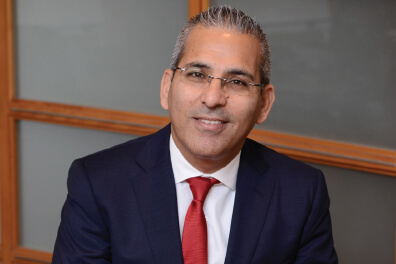
Raqmiyat CEO Amer Khreino believes emerging technologies will have a hugely transformative effect on the way services will be delivered in 2019.
Give us a brief background on your organisation’s technology portfolio.
Raqmiyat today is among the leading companies in UAE and Middle East in business automation and digitisation. Our solutions and services cover a wide range of technologies that are of interest to our valued customers including cloud services, analytics, cybersecurity, AI, smart infrastructure and digital transformation platforms. We are on track to transform banks into digital banking. More predictive analysis with AI capabilities for better business planning across the government sector and advanced IT services for building sound and profitable businesses.
Which technology trends do you believe will see the biggest uptake in the coming 12 months? What kinds of specific products and services will be needed to make this a reality?
Both public and private sectors are trying hard to reduce operating costs while finding ways and means to enhance business efficiency. Artificial Intelligence will see a big boost in 2019. AI is able to add significant value to our homes and businesses. For example, AI is used to learn our behaviour to adjust home settings, in banks it’s used to expand customer services and fraud protection, and in travel it simplifies bookings and reservations.
Another technology that will define the future is 5G, as IoT won’t be practical or efficient without 5G that promises multi-gigabit download speeds.
Smart and safe cities will continue to grow as more governments and municipalities start integrating sensors technology into infrastructure to benefit public health and safety. Facial recognition (and other biometric solutions) will accelerate as this technology starts replacing old technologies in campuses, schools, companies and airports.
High bandwidth capabilities, service-oriented architecture (SOA) and integrating services are essential during this transformation.
What kind of changes do organisations need to make in order to transform themselves?
Building a culture of change management is crucial to embrace emerging disruptive technologies. The scale and speed that these new technologies are shaping our business and life is unprecedented. These technologies are changing our job value and defining new business models that will impact the workforce, employment, career prospects and the future of coming generations.
Organisations need to build their new business models that address this change in business and operating models, have larger room for business collaboration rather than assuming big fixed costs, while building compensation models that reflect the value addition, creativity and innovation. In a nutshell, it will be hard to compete without having a business structure that is agile, efficient and empowered across all levels.
What will happen to organisations that fail or refuse to adopt transformative technologies?
I would like to quote an article by Richard Watson of Imperial College London, on why companies die. He addresses the average lifespan of an S&P 500 company in the US, which has fallen from 67 years in the 1920s to just 15 years today. In the UK it’s a similar story. Of the 100 companies in the FTSE 100 in 1984, only 24 were still alive in 2012. With start-ups, it’s not looking great either, with almost 50% of the SMEs failing to celebrate their 5th birthday. Watson states that if companies wish to remain healthy and grow old they need to do two things. Firstly, they need to remain young at heart. They need to remain mentally agile, constantly learn new things and questioning their own identity and reason for being.
Among others, some of the fatal attributes that contribute to companies’ failures include the rejection of new ideas, the increase in the ratio between fixed costs to overall expenses, and, finally, the lack of creativity and innovation.
What part do you believe your technologies will play in the society of 2025?
In my view, by 2025, technology will transform almost all industries and will impact our societies in a way that never been before. Education is already transforming, with more online and home-schooling. Financial institutions moving towards decentralised digital services and home medical care that benefits the latest embedded technologies with central nursing monitoring systems.
In business, the shift will continue towards mobile and efficient structures that focus on innovation and collaboration rather than fixed cost, benefiting video conferencing, VR and AR technologies to reduce cost while boosting productivity and the user experience.
How do you believe the Middle East’s biggest cities will be reshaped by technology in the coming years?
Huge investment is being allocated towards business automation, digitisation and smart cities across the Middle East region. The ROI is justifiable considering the big savings in operating costs to run and supervise larger cities, making them safer and more liveable. Technology today can ensure bigger cities are safer and more efficient, be it in transportation infrastructure, telecommunication, utilities, medical and health care, financial services, education, or other industries. The impact on GDP will be significant, as tourism, industry and trade flourish, benefiting from this safe and efficient environment.





